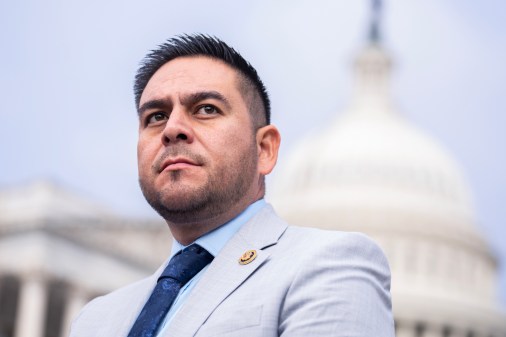DHS offering grants to states, local governments for counter-drone tech ahead of major national events

The Department of Homeland Security’s non-federal government partners in communities across the U.S. can now apply for funding grants for certain counter-drone capabilities to address national security and safety threats posed by the illegal and nefarious use of unmanned aircraft systems.
“The funding enables state, local, tribal, and territorial governments, along with first responders and public safety entities, to acquire detection and tracking technologies designed to safeguard public spaces and critical infrastructure,” officials wrote in a notice published online this week.
DHS estimates that $250 million will be obligated for the program in fiscal 2026 alone, and more money is expected to flow. Decisions about individual awards will happen between 30 and 60 days of the application submissions. Interested SLTT agencies are directed to “contact the headquarters or regional location, as appropriate for application deadlines.”
The department expects to make 12 awards, with the financial assistance amounts to-be-decided and ranging across the winners. All projects will have a performance period of 36 months.
Notably, the awardees will not be permitted to use the federal funding to purchase “Enhanced Detect, Track, Identification (DTI) systems,” including those that “capture, record, intercept, demodulate, decrypt, or decode signals” between UAS and ground control stations. Due to significant legal restrictions, privacy concerns and federal airspace regulations, SLTT entities don’t currently have official authorization to employ those types of technologies.
“While federal agencies may use enhanced DTI techniques, they require additional statutory authority to do so. SLTT entities currently have no statutory authority available to them to use enhanced DTI” for counter-drone efforts, the notice states.
“In addition, anyone approved to purchase this equipment must have either gone through the Federal Bureau of Investigations Schoolhouse or be scheduled to go through this training and certification program,” officials wrote, referring to the intensive program for FBI and law enforcement agents.
Drone threats associated with surveillance, disruption, or attacks, have intensified across the nation in recent years. The U.S. military is significantly expanding work and investments to deploy defensive weapons, modernize electronic warfare capabilities, enhance sensor protection and other tools to protect its facilities in the United States and abroad.
And with America hosting major, upcoming global events, agencies and officials have been calling for coordinated efforts to more aggressively confront the risks.
“Projects receive an effectiveness score based on related training and equipment proposed, as well as a prioritization score for projects in cities hosting events of National significance, such as World Cup, America 250, the Olympics, etc. Funding is allocated to projects based on the risk associated with the project location, multiplied by effectiveness of the project,” DHS officials wrote in the grant notice released this week. “Funds are recommended in rank order of scores and allocated at the discretion of the Secretary of the Department of Homeland Security.”
They also noted that this opportunity was sparked by the One Big Beautiful Bill Act — signed into law by President Donald Trump in July — which included $500 million for “State and local capabilities to detect, identify, track, or monitor threats from” UAS.
That legislation also has provisions that pledge $625 million “for security and other costs related to the 2026 FIFA World Cup,” $1 billion for “security, planning, and other costs related to the 2028 Olympics,” and $450 million for the Operation Stonegarden Grant Program that focuses on U.S. border security.
Separately from the DHS counter-drone grant notice, on Tuesday the Federal Emergency Management Agency unveiled its grant program that seeks to supply $625 million to the 11 cities hosting World Cup games in 2026 — for preparation efforts, cybersecurity defense, training, and increased police and emergency response for relevant venues.
“The 2026 FIFA World Cup is expected to be the largest sporting event in history, so it must also be the safest,” a FEMA spokesperson said in a press release. “That’s why DHS is already working with host cities to ensure players, staff and attendees are safe from all threats, including terrorist activities and criminal use of drones.”
DHS and FEMA spokespersons did not respond to DefenseScoop’s requests for more information about the grants this week.




